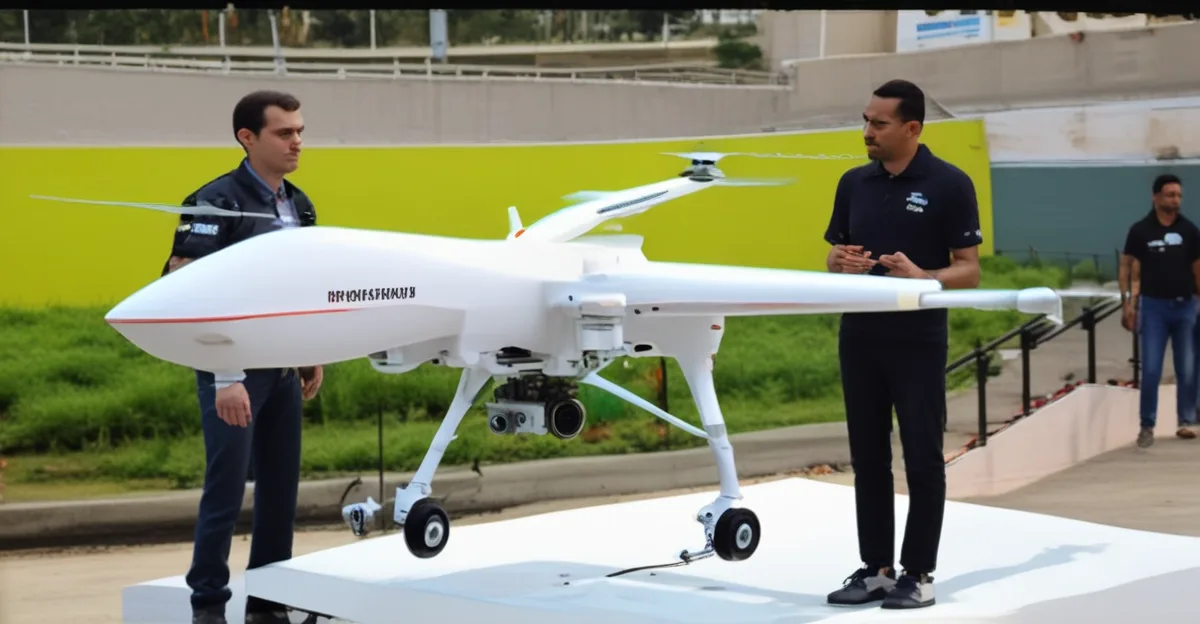Auto-published by Growwh – a smarter way to scale content and marketing. Want to know more? Chat with us.
Zuppa, a Chennai-based startup, develops AI-powered, cybersecurity-focused drones with GPS-independent navigation for defence and enterprise. Auto-published by Growwh – a smarter way to scale content and marketing. Want to know more? Chat with us. Drones are transforming modern warfare and commercial applications worldwide through real-time surveillance, precision strikes, and autonomous operations. However, India has long faced challenges relying heavily on expensive Western imports or vulnerable open-source drone systems that use Chinese components, leading to hacking and electronic jamming risks. Since 2019, Chennai-based startup Zuppa has focused on filling this gap by designing and manufacturing unmanned aerial systems (UAS) tailored to India’s defence, security, and enterprise needs. Founded by Sai Pattabiram and Venkatesh Sai, Zuppa offers indigenously developed hardware and software solutions that emphasize cybersecurity, autonomy, and operational independence. India’s Growing Drone Market and Zuppa’s Niche The global commercial drone market was valued at $13.86 billion in 2024 and is projected to reach $65.25 billion by 2032, growing at a CAGR of 20.8% between 2025 and 2032, according to Fortune Business Insights. This soaring demand creates a vast opportunity for Indian firms capable of producing secure, high-performance drones that meet both national security requirements and commercial needs. Zuppa’s Cutting-Edge Drone Lineup Zuppa’s flagship drones include the Hawk, Scout, Eagle, and Ajeet Mini models—each designed for surveillance, reconnaissance, mapping, logistics, and precision payload delivery. Notably, these drones employ advanced AI algorithms and swarming technology, enabling multiple drones to coordinate like a flock for complex mission scenarios. Hawk, Scout, Eagle: Successfully deployed during Operation Sindoor, these drones provided Indian defence forces with early warning over enemy movements and assessed potential threats up to 2 km inside the Line of Control. Ajeet Mini: Developed as a compact, fully indigenous alternative to Chinese consumer drones like DJI, which currently dominates 75% of the global market. Ajeet drones are powered by Zuppa’s in-house NavGati autopilot system running on Indian-made PCBs and chips developed in collaboration with the Centre for Development of Advanced Computing (C-DAC). These drones are engineered to operate from sea level to altitudes of 18,000 feet even in GPS-denied environments, while maintaining strong resistance to electronic warfare and hacking attempts. Innovative Systems Powering Zuppa Drones At the heart of Zuppa’s technology is the patented Distributed Parallel Control Computing (DPCC) architecture, granted by the Indian Patent Office after a nine-year evaluation process in April 2024. This cutting-edge system works like the human brain by processing multiple sensory inputs simultaneously, enabling reflexive drone navigation such as obstacle avoidance and real-time decision-making. Zuppa’s key systems include: NavGati Autopilot: A sophisticated motherboard processing inputs from diverse sensors to control drone movement across X, Y, and Z axes autonomously. Drishaya Vision: An interface that leverages live camera feeds for real-time piloting, enhancing situational awareness during operations. Every drone adheres to international cybersecurity standards (OWASP 4.0), reinforced by fully in-house developed chipsets to safeguard operational independence. The Making of Zuppa’s Indigenous Autopilot The origins of NavGati and Zuppa’s autopilot trace back to 2011 during research at National Aerospace Laboratories (NAL) and Anna University under India’s National Programme on Micro Air Vehicles (NP-MICAV). While initial drone components like motors and batteries were widely accessible, the autopilot—essential for flight control, navigation, and autonomy—was identified as a critical technology requiring indigenous development to reduce foreign dependence. Zuppa adopted an integrated ecosystem approach, inspired by Apple, aiming to unify different drone types into a cohesive system. Its autopilot systems use STM32 processors from STMicroelectronics (sourced from Malaysia, France, and the US) to strategically avoid reliance on Chinese components while maintaining global standards and compatibility. Defence and Industrial Market Impact Zuppa primarily serves the Indian defence sector, providing the Army and Ministry of Defence with secure, homegrown drone alternatives to the approximately 3,000 Chinese-made drones purchased annually. Its contributions include: Delivery of man-portable backpack UAVs to National Aerospace Laboratories. Deployment of 8,000 to 9,000 vehicle tracking systems mainly in Kerala. Collaborations with industrial leaders like Hyundai, John Deere, and Mahindra for inventory management, precision agriculture, and autonomous vehicle projects. The company benefits from progressive government policies such as the 2018 drone regulations, Agriculture Ministry’s 75% local content mandate, Directorate General of Civil Aviation (DGCA) approvals, and the Make in India initiative—all fueling domestic drone innovation. Strategic Partnerships and Support Zuppa collaborates with multiple stakeholders to strengthen India’s drone ecosystem, including: Drone industry players like DroneAcharya Aerial Innovations and Garuda Aerospace. Indian Army’s Madras Regimental Centre (MRC) on drone training and operational frameworks. Academic institutions such as Anna University and National Aerospace Laboratories for aeromodelling workshops and UAV training programs. Government programs like NIDHI-PRAYAS and Tamil Nadu’s TAN-FNF for startup growth and R&D support. Ambitious Growth and International Expansion With a 40-member team and total funding of Rs 20 crore to date, including a recent Rs 12.3 crore bridge round in July 2025, Zuppa is accelerating its GPS-independent drone tech development. Its Rs 5 crore May 2025 fundraise supports the expansion of the Ajeet Series. Zuppa aims to become the leading provider of indigenous autopilot systems and expand beyond Indian borders into lucrative markets like the US and UK, where demand for non-Chinese drones is rising, driven by initiatives such as the US Innovate to Accelerate (I2A) program. While defence remains central, Zuppa is actively exploring agricultural applications aligned with local content requirements, positioning itself as a trusted global partner with patented technology and full control over its technology stack. Conclusion Zuppa exemplifies India’s ambitions in unmanned aerial systems by pioneering secure, AI-enabled drones with indigenous technology and strong cybersecurity focus. With a growing portfolio addressing defence, industrial, and agricultural sectors, it is driving forward the country’s goal to achieve technological sovereignty in the drone industry. As domestic demand surges and export potential expands, Zuppa’s innovative solutions promise to reshape how India and the world deploy unmanned systems for security and enterprise. Source This article was auto-generated as part of a smart content campaign. Curious how we do it? Chat with us to learn more about our content automation systems.
This article was auto-generated as part of a smart content campaign. Curious how we do it? Chat with us to learn more about our content automation systems.
Discover more from Growwh
Subscribe to get the latest posts sent to your email.


